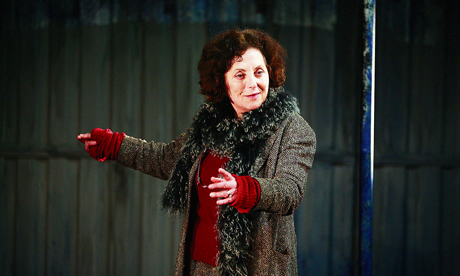Interview: Helena Kaut-Howson

Helena Kaut-Howson, in rehearsal of Innocence , Arcola 2010. Photo: John Haynes
The art of translation is tricky. Especially when it comes to translating literature. Striking the delicate balance between accuracy of meaning and freedom of interpretation is a feat in itself. Hours are spent grappling over the original intentions of an author, and the less said about the ‘What am I?’ identity crises of artistic translators, the better.
The charge of translating one of the greatest playwrights in Russian history – Anton Chekhov – has been taken up by Polish-born director, Helena Kaut-Howson, whose new version of his iconic play Uncle Vanya opens at the Arcola theatre on 27 April.
Helena, who has directed over 100 theatre and opera productions, served as the director of Theatr Clwyd in Wales from 1991 to 1995, where her adventurous policies attracted major artists including Sir Antony Hopkins, Julie Christie and Timothy West. Her latest endeavour at the Arcola is the realisation of a long-held ambition: “Chekhov is very close to my heart, and always has been. But I’ve only worked on Chekhov through my teaching at LAMDA and RADA, and have never done a professional run of a Chekhov play. I feel that, although there are some wonderful existing translations, the tone of Chekhov’s plays often get lost in the process. What is much more ironic and laid back in Russian feels so much more stilted in English. Maybe this is not translatable, but as I speak Russian, I’m trying to keep this original essence in my version.”
Citing the masterful Michael Frayn, Helena Kaut-Howson explains that the key to a successful translation is in honouring Chekhov’s comic tone: “I’m very interested in the nature of the play’s comedy, which is something that Frayn explores. Normally people think, ‘Well it should be a comedy, but really it’s just a bit depressing.’ In fact, there’s a lot of humour there in the play and I’ve worked on drawing it out. Mainly it’s to do with the pauses. Famous for his use of silence, Chekhov places pauses throughout his text. But instead of seeing them as absences of drama, I’m accessing the humour in them.”
Just as Tom Stoppard was accused of being ‘over-free’ with his translation of Chekhov’s Ivanov for the Donmar Warehouse’s West End season in 2008, Helena Kaut-Howson addresses the difficult dynamic between playwright and translator. “Once a play is printed, once the text is on the page, interpretations begin. The play changes slightly every time it is approached, it is filtered through producers, directors, actors, audiences – it is not a fixed thing. So to believe that it is only a translator who interprets the play is far from the truth.”
This being said, Kaut-Howson believes in holding onto Uncle Vanya’s point of origin, and has prioritised staying true to the original text in her upcoming production: “I am very faithful to the story. These are Chekhov’s ideas, his words, and his meanings. However, in my case, because I am translating and directing, the production is very much my vision of Chekhov’s story, and I have been very free with the style of the production.”
The longevity of Chekhov’s legacy is an element of his work that fascinates Helena Kaut-Howson: “What makes Chekhov so interesting is how he writes about very normal people who would never ordinarily get recognition, but does so in a remarkably profound way.”
It is Chekhov’s bleak, yet colourful representation of everyday life that has sustained audiences for over 100 years, and Helena Kaut-Howson’s upcoming production will contribute to this legacy.
“When you think about why Chekhov has endured, it’s so much to do with the universal issues that he chose to write about. He didn’t look at politics, but instead wrote about love and great passion. He took characters who have reached the middle of their lives, stop, look back, and say ‘Is that all?”
Uncle Vanya
Arcola Theatre
24 Ashwin Street, Dalston E8 3DL
27 April – 4 June 2011
Box Office: 020 7503 1646
